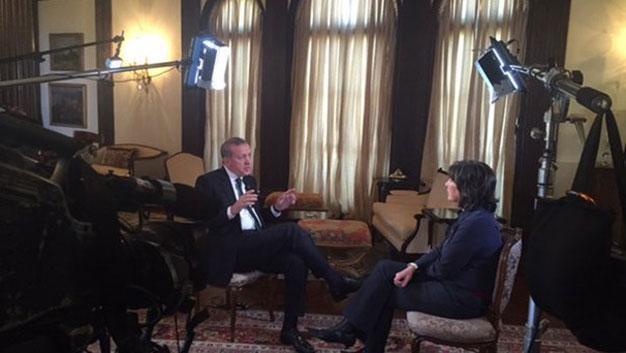I am not at war with press, Turkish President Erdoğan tells CNN
WASHINGTON
 President Recep Tayyip Erdoğan has rejected criticism that he has been “waging a war” against press groups, saying “criticism” should not be confused with “insult and defamation.”
President Recep Tayyip Erdoğan has rejected criticism that he has been “waging a war” against press groups, saying “criticism” should not be confused with “insult and defamation.”Speaking to CNN International’s Christiane Amanpour in an exclusive interview in Washington, where he was to attend the Nuclear Security Summit, Erdoğan said he was “not at war with the press.”
“We have to define what war against press stands for in your point of view and in my point of view,” he said.
“We have never done anything to stop freedom of expression or freedom of press. On the contrary, the press in Turkey had been very critical of me and my government, attacking me very seriously. And regardless of those attacks, we have been very patient in the way we have responded to those attacks,” Erdoğan added.
Amanpour also asked the Turkish president whether his response to a video from a German comedy show ridiculing him showed he had “very thin skin.”
“Satire, whether it is satire or not, everything has to have boundaries. A simple caricature, a simple sketch - that’s fine. There’s nothing wrong with that. But if you draw a caricature ... and if you associate that subject with the things you’re not supposed to, then, of course, you can’t expect that to be acceptable,” he said.
Consuls general ‘supportive of people allegedly engaged in espionage’
Erdoğan also harshly criticized consuls general, including the British and German envoys in Istanbul, for recently attending the first hearing in a trial of Cumhuriyet editor-in-chief Can Dündar and Ankara bureau chief Erdem Gül, who are accused of espionage after reporting claims that Turkey’s intelligence agency funneled weapons into Syria.
“It’s OK for journalists to come as observers of the trials. It’s different to have consuls general attending tribunals collectively, supporting people who allegedly engaged in espionage. [This] will never be tolerated,” he said.
“My country has laws. If a member of the press or an executive of a newspaper [is] engaging in espionage, disclosing a country’s secrets to the rest of the world, and if this conduct becomes a part of a litigation, then that will result in a verdict. This will be case wherever you go around the world. Engaging in actions that are not allowed by law should have certain prices to pay,” he added.
European countries ‘enabled terror threat to spread’
The global terror threat and the conflict in both Turkey’s southeast and the wider region were also addressed in Erdoğan’s interview with CNN.
The Turkish president said he believed many European countries have “failed to address the significance of the terror threat and have not done enough to fight it.”
He criticized those countries for allowing the Islamic State of Iraq and the Levant (ISIL) to spread, accusing many European states of “not having met their obligations” regarding the flow of jihadists from Europe.
Erdoğan particularly slammed Belgian authorities for showing “similar negligence” in handling the case of Ibrahim El Bakraoui, the suspected Brussels bomber who was captured by Turkish authorities and deported to the Netherlands last year. The Belgian authorities flagged him soon afterward.
“We have been calling on all countries for a common stance against terrorism, and many of the EU member states seem to have failed to attach the significance that this call deserves,” Erdoğan said.
“We were left alone by Western countries. Our intelligence-sharing expectations were never met,” he added.
Heralding Turkey’s “enduring commitment” to fighting ISIL, Erdoğan said “we are committed to this goal and we expect the same determination from Western countries as well.”
Peace in Syria
Erdoğan also said Turkey, the U.S. and other international allies “had to work together and jointly for the protection of the territorial integrity of Syria and for the establishment of a long-lasting peace.”
“I’m not in the position to allow the handing over of some parts of Syria to some terrorist organizations. Should that mistake ever be made, I would always be reminded about it,” he said.
Asked which terror organization he was referring to, Erdoğan replied: “The YPG [the Syrian Kurdish People’s Protection Unit], the PYD [the Democratic Union Party] ... and if Daesh [ISIL] has an intention of that sort then it would also never be allowed.”
Turkey and the U.S. are at odds over the designation of the PYD and the YPG, which Turkey sees as terror organizations as it regards as offshoots of the outlawed Kurdistan Workers’ Party (PKK). The U.S. sees the PYD and the YPG as reliable partners in the fight against ISIL in northern Syria.
Erdoğan said Turkey did not discriminate between “good” and “evil” terrorist organizations. “A terrorist organization is evil and none of them should be allowed,” he said.
Freedom of the press and expression ‘irrelevant obstacles’ for joining the EU
CNN’s interviewer Amanpour also referred to alleged obstacles to Turkey’s accession to the EU created by Turkey’s “troubled relationship with journalists.”
Erdoğan claimed that freedom of the press and expression are “irrelevant obstacles,” despite the fact that the EU has repeatedly warned that these rights were “nonnegotiable” conditions.
“Although we were one of the first applicants for EU membership, we’re still waiting at the doorstep. We are still being kept busy with irrelevant obstacles, but we are very patient,” he said.
Erdogan has been at the top of Turkish politics for more than a decade, serving as Prime Minister from 2003 to 2014, when he was elected president. He remains popular at home.
“So long as you love the people sincerely and deeply, people will love you” Erdoğan told Amanpour.
















